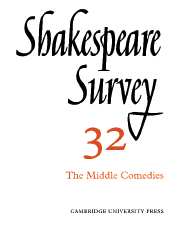Book contents
- Frontmatter
- Shakespeare’s Middle Comedies: A Generation of Criticism
- ‘Perfect Types of Womanhood’: Rosalind, Beatrice and Viola in Victorian Criticism and Performance
- The Stage Representation of the ‘Kill Claudio’ Sequence in Much Ado About Nothing
- As You Like It Adapted: Charles Johnson’s Love in a Forest
- Social Relations and the Social Order in Much Ado About Nothing
- Sexual Disguise in As You Like It and Twelfth Night
- Twelfth Night and the Myth of Echo and Narcissus
- ‘Smiling at grief’: Some Techniques of Comedy in Twelfth Night and Così Fan Tutte
- ‘My Lady’s a Catayan, we are politicians, Maluolios a Peg-a-ramsie’ (Twelfth Night II, iii, 77-8)
- The Importance of Being Marcade
- A Hebrew Source for The Merchant of Venice
- The Marriage Contracts in Measure for Measure: A Reconsideration
- Richard III: Antecedents of Clarence’s Dream
- Deep Plots and Indiscretions in ‘The Murder of Gonzago’
- ‘What is’t to leave betimes?’ Proverbs and Logic in Hamlet
- The Tempest: Language and Society
- Pictorial Evidence for a Possible Replica of the London Fortune Theatre in Gdansk
- A Year of Comedies: Stratford 1978
- The Year's Contributions to Shakespearian Study: 1 Critical Studies
- 2 Shakespeare’s Life, Times and Stage
- 3 Textual Studies
- Index
- Plate section
A Year of Comedies: Stratford 1978
Published online by Cambridge University Press: 28 March 2007
- Frontmatter
- Shakespeare’s Middle Comedies: A Generation of Criticism
- ‘Perfect Types of Womanhood’: Rosalind, Beatrice and Viola in Victorian Criticism and Performance
- The Stage Representation of the ‘Kill Claudio’ Sequence in Much Ado About Nothing
- As You Like It Adapted: Charles Johnson’s Love in a Forest
- Social Relations and the Social Order in Much Ado About Nothing
- Sexual Disguise in As You Like It and Twelfth Night
- Twelfth Night and the Myth of Echo and Narcissus
- ‘Smiling at grief’: Some Techniques of Comedy in Twelfth Night and Così Fan Tutte
- ‘My Lady’s a Catayan, we are politicians, Maluolios a Peg-a-ramsie’ (Twelfth Night II, iii, 77-8)
- The Importance of Being Marcade
- A Hebrew Source for The Merchant of Venice
- The Marriage Contracts in Measure for Measure: A Reconsideration
- Richard III: Antecedents of Clarence’s Dream
- Deep Plots and Indiscretions in ‘The Murder of Gonzago’
- ‘What is’t to leave betimes?’ Proverbs and Logic in Hamlet
- The Tempest: Language and Society
- Pictorial Evidence for a Possible Replica of the London Fortune Theatre in Gdansk
- A Year of Comedies: Stratford 1978
- The Year's Contributions to Shakespearian Study: 1 Critical Studies
- 2 Shakespeare’s Life, Times and Stage
- 3 Textual Studies
- Index
- Plate section
Summary
Apart from Peter Brook’s production of Antony and Cleopatra (opening too late for review), the 1978 season at Stratford-upon-Avon consisted entirely of comedies, ranging over the entire spectrum: A Midsummer Night’s Dream (revived from 1977, when it was enthusiastically reviewed here), The Taming of the Shrew, The Tempest, Measure for Measure, Love’s Labour’s Lost, and (at the Other Place, the RSC’s Stratford studio) The Merchant of Venice. It presented an interesting mixture of old and new in that two RSC directors of long standing, Clifford Williams and John Barton, had directed The Tempest and Love’s Labour’s Lost before at Stratford, during the Peter Hall regime, whereas Michael Bogdanov and Barry Kyle were in sole charge of plays in the main house for the first time.
The opening of Michael Bogdanov's Taming of the Shrew exploited the current fashion for blurring the distinctions between theatrical 'realism' and 'artifice', presumably to emphasise enduring 'relevance'. After being unexpectedly faced with old-fashioned painted scenery, the audience was suddenly startled by a deceptively genuine squabble between an usherette and a drunk member of the audience without a ticket. 'No bloody woman is going to tell me what to do!' he cried, thus making the play's relevance plain. Leaping on to the stage, he tore apart all the illusory scenery, revealing a respectably contemporary series of rusty metal frames, staircases, and cat-walks.
- Type
- Chapter
- Information
- Shakespeare Survey , pp. 201 - 210Publisher: Cambridge University PressPrint publication year: 1980

